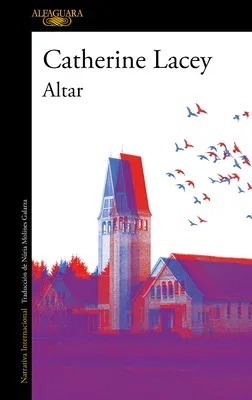GANADORA DEL YOUNG LIONS FICTION AWARD, FINALISTA DEL PREMIO DYLAN
THOMAS, Y UNA DE LAS MEJORES NOVELAS DEL AÑO SEGÚN VARIOS MEDIOS
«Una obra magistral, su mejor libro hasta la fecha». -Publishers
Weekly
«Maravillosa, bellísimamente escrita [...], con una atmósfera
inquietante [...]. No puedo dejar de insistir en lo dulce, lo ágil y
lo entretenida que es esta novela». -Lionel Shriver, Financial Times
Una persona llega a un pequeño pueblo de Estados Unidos. Las gentes del
lugar la encuentran durmiendo en un banco de la iglesia, donde se ha
refugiado durante la noche. Es imposible discernir su raza, su edad o su
sexo y, aunque entiende el idioma en el que le hablan, se niega a
pronunciar palabra o a contar su historia. La comunidad local, unida por
una fuerte fe religiosa, se muestra dispuesta a acogerla y le da el
nombre de Altar, pero en los seis días siguientes, previos al misterioso
Festival del Perdón, su presencia acaba exponiendo los miedos más
profundos y las hipocresías de la congregación.
Lacey ha creado una fábula hipnótica que nos plantea preguntas urgentes
sobre nuestra identidad, nuestro cuerpo y nuestra capacidad de
entendimiento: una novela perturbadora y esencial.
ENGLISH DESCRIPTION
WINNER of the 2021 NYPL Young Lions Fiction Award. Finalist for the
2021 Dylan Thomas Prize. Longlisted for the 2021 PEN/Jean Stein Book
Award, the Andrew Carnegie Medal for Excellence in Fiction and the Joyce
Carol Oates Prize. One of Publishers Weekly's Best Fiction Books of
2020.
"The people of this community are stifling, and generous, cruel,
earnest, needy, overconfident, fragile and repressive, which is to say
that they are brilliantly rendered by their wise maker, Catherine
Lacey." -Rachel Kushner, author of The Flamethrowers
In a small, unnamed town in the American South, a church congregation
arrives for a service and finds a figure asleep on a pew. The person is
genderless and racially ambiguous and refuses to speak. One family takes
in the strange visitor and nicknames them Pew.
As the town spends the week preparing for a mysterious Forgiveness
Festival, Pew is shuttled from one household to the next. The earnest
and seemingly well-meaning townspeople see conflicting identities in
Pew, and many confess their fears and secrets to them in one-sided
conversations.
Pew, Catherine Lacey's third novel, is a foreboding, provocative, and
amorphous fable about the world today: its contradictions, its flimsy
morality, and the limits of judging others based on their appearance.
With precision and restraint, one of our most beloved and
boundary-pushing writers holds up a mirror to her characters' true
selves, revealing something about forgiveness, perception, and the
faulty tools society uses to categorize human complexity.

